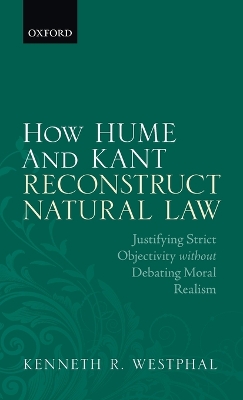Kenneth R. Westphal presents an original interpretation of Hume's and Kant's moral philosophies, the differences between which are prominent in current philosophical accounts. Westphal argues that focussing on these differences, however, occludes a decisive, shared achievement: a distinctive constructivist method to identify basic moral principles and to justify their strict objectivity, without invoking moral realism nor moral anti-realism or irrealism. Their
constructivism is based on Hume's key insight that 'though the laws of justice are artificial, they are not arbitrary'. Arbitrariness in basic moral principles is avoided by starting with fundamental problems of social cooerdination which concern outward behaviour and physiological needs; basic principles
of justice are artificial because solving those problems does not require appeal to moral realism (nor to moral anti-realism). Instead, moral cognitivism is preserved by identifying sufficient justifying reasons, which can be addressed to all parties, for the minimum sufficient legitimate principles and institutions required to provide and protect basic forms of social cooerdination (including verbal behaviour). Hume first develops this kind of constructivism for basic property rights and
for government. Kant greatly refines Hume's construction of justice within his 'metaphysical principles of justice', whilst preserving the core model of Hume's innovative constructivism. Hume's and Kant's constructivism avoids the conventionalist and relativist tendencies latent if not explicit in
contemporary forms of moral constructivism.
- ISBN10 0198747055
- ISBN13 9780198747055
- Publish Date 7 April 2016
- Publish Status Active
- Publish Country GB
- Publisher Oxford University Press
- Imprint Clarendon Press
- Format Hardcover
- Pages 270
- Language English
